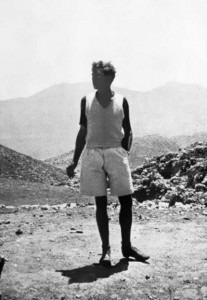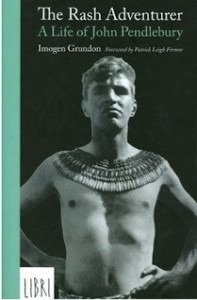
 Rounding out the final four position for the Indian Jones question is a British archaeologist by the name of John Pendlebury. Born in London in 1904, John Pendlebury had blinded himself in one eye by age eight, received scholarships for Pembroke and eventually competed internationally as a high jumper. Pendlebury made is mark in the world in Greek archaeology. The climate in the Mediterranean allowed for Pendlebury to work in both Greece and Egypt in a single field season. Crete became a second home to him and he worked closely with native Cretans to understand the history of the island. He was one of the first to look at local legend, folklore and stories to ascertain more about the physical history of a place. Shepherds would show him to places that they had known about for generations and Pendlebury would soon be digging there. Some people believe this was taking advantage of the locals for self aggrandizement, but that seems to sell the locals a but short. This was the late 1920s and early 30s, the world worked differently than it does today.
Rounding out the final four position for the Indian Jones question is a British archaeologist by the name of John Pendlebury. Born in London in 1904, John Pendlebury had blinded himself in one eye by age eight, received scholarships for Pembroke and eventually competed internationally as a high jumper. Pendlebury made is mark in the world in Greek archaeology. The climate in the Mediterranean allowed for Pendlebury to work in both Greece and Egypt in a single field season. Crete became a second home to him and he worked closely with native Cretans to understand the history of the island. He was one of the first to look at local legend, folklore and stories to ascertain more about the physical history of a place. Shepherds would show him to places that they had known about for generations and Pendlebury would soon be digging there. Some people believe this was taking advantage of the locals for self aggrandizement, but that seems to sell the locals a but short. This was the late 1920s and early 30s, the world worked differently than it does today.
 Similar to Sylvanus Morley, John Devitt Stringfellow Pendlebury was called to use his expertise to the good of his country during wartime. His knowledge of Crete and surrounding areas, his fluency with the language, and innumerable friends (on both sides of legality) led him to work as one of the top British Intelligence Agents in Greece. His closeness with the local gentry may have also led to his unfortunate death. When the Germans invaded mainland Greece Pendlebury and crew were in Heraklion. As the fighting progressed Pendlebury was shot in the chest. The wound was not fatal and he was carried inside a small cottage to rest. It is reported that a German doctor treated Pendlebury, dressed his wounds, and gave him some sort of an injection. He was given a clean Greek shirt to replace his bloodstained uniform, and when fresh German paratroopers arrived they found a local wounded rebel lying in a cottage bed. Pendlebury had lost his service discs and could not prove he was in fact a British soldier. He was dragged outside, placed against the wall of the cottage and summarily executed; killed in the Battle of Crete, his adopted home, fighting for his adoptive countrymen.
Similar to Sylvanus Morley, John Devitt Stringfellow Pendlebury was called to use his expertise to the good of his country during wartime. His knowledge of Crete and surrounding areas, his fluency with the language, and innumerable friends (on both sides of legality) led him to work as one of the top British Intelligence Agents in Greece. His closeness with the local gentry may have also led to his unfortunate death. When the Germans invaded mainland Greece Pendlebury and crew were in Heraklion. As the fighting progressed Pendlebury was shot in the chest. The wound was not fatal and he was carried inside a small cottage to rest. It is reported that a German doctor treated Pendlebury, dressed his wounds, and gave him some sort of an injection. He was given a clean Greek shirt to replace his bloodstained uniform, and when fresh German paratroopers arrived they found a local wounded rebel lying in a cottage bed. Pendlebury had lost his service discs and could not prove he was in fact a British soldier. He was dragged outside, placed against the wall of the cottage and summarily executed; killed in the Battle of Crete, his adopted home, fighting for his adoptive countrymen.

There are may passing mentions of John Pendlebury and the Battle of Crete, a chapter here, or a brief passage there. There are several books that Pendlebury wrote on Bronze Age Greece, Knossos, and other areas he worked. None ever really tied together the story of the man. Thankfully in 2007 Imogen Grunden published The Rash Adventurer: The Life of John Pendlebury. The book is a fairly substantial work of research that lays to rest a few myths and answers many questions about Pendlebury. The author, however, does not offer any input on the famous last words of Pendlebury as he was standing at the cottage wall. A common legend among followers and some contemporaries of Pendlebury maintain that he told the Germans, in no uncertain terms, to be fruitful and multiply…with themselves. But, as with all good stories, this one seems impossible to substantiate.
 Other more entertaining stories come to light as well, such as how the Germans believed he was behind everything going against them in Crete, and if he died all of Greece would fall under German control. How supposedly Hitler wanted his glass eye as proof of his death, and that the German soldiers exhumed his grave to make sure he was dead. These were brought back to light by an article posted here by the UK Mail online (take it for what you will, I nicked the photo). Either way, the legends seem fitting for someone deemed “The Cretan Lawrence.”
Other more entertaining stories come to light as well, such as how the Germans believed he was behind everything going against them in Crete, and if he died all of Greece would fall under German control. How supposedly Hitler wanted his glass eye as proof of his death, and that the German soldiers exhumed his grave to make sure he was dead. These were brought back to light by an article posted here by the UK Mail online (take it for what you will, I nicked the photo). Either way, the legends seem fitting for someone deemed “The Cretan Lawrence.”
